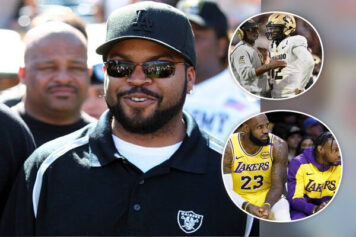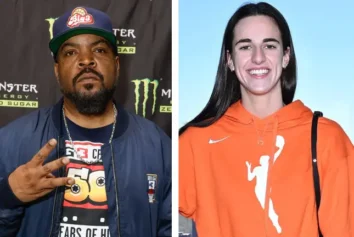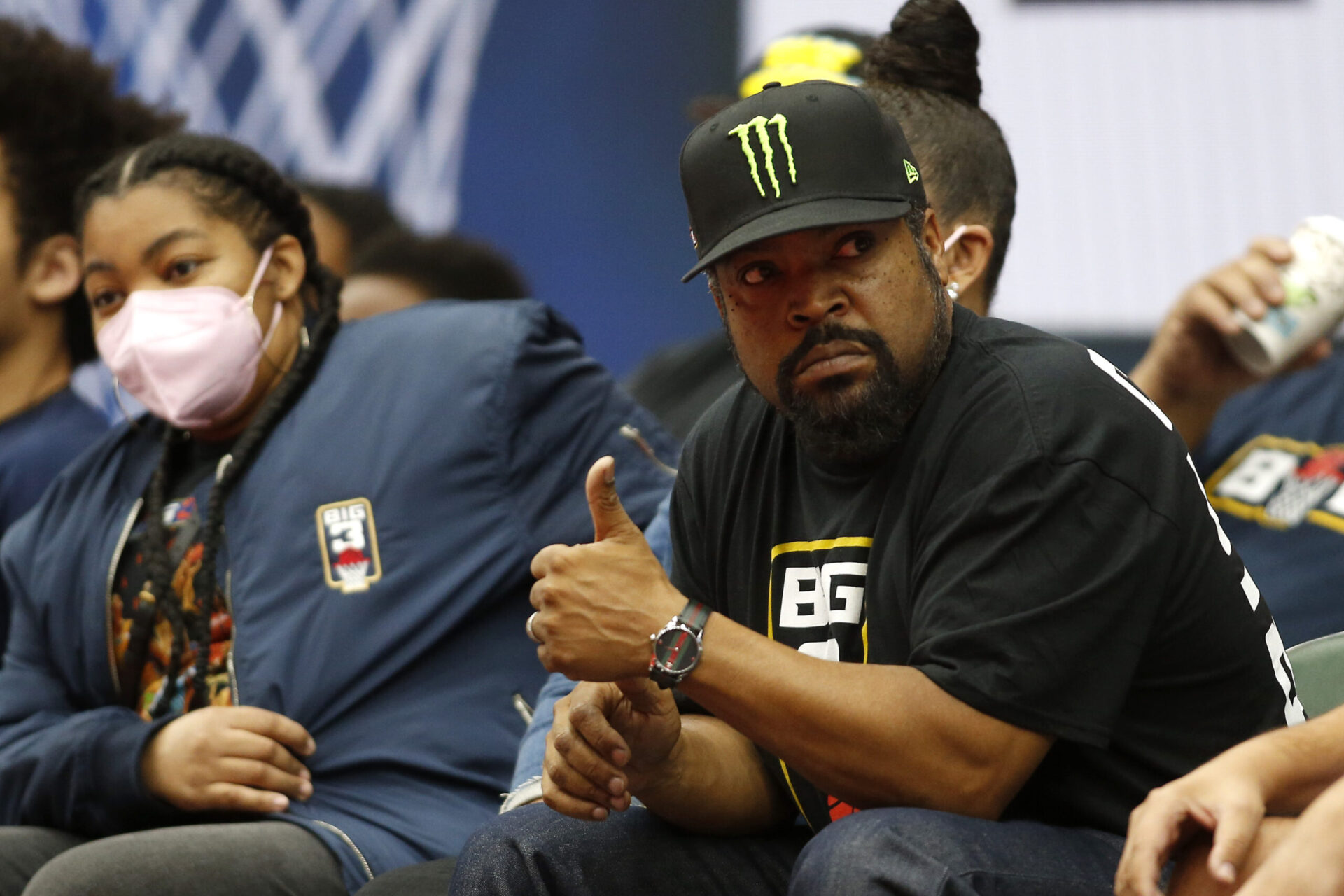It’s that look: The trademark scowl and furrowed eyebrows with flared nostrils that give red flag visions of a seething bull. Ice Cube’s legendary, angry, facial expressions have helped brand and shape his career spanning all the way back to the ‘80s as a backbone member of N.W.A, writing raging lyrics for Dr. Dre and Eazy-E. Cube’s most popular ghetto commentary will forever be remembered for 1988’s colorfully flagrant, protest anthem, “Fuck tha Police.”
Fuck the police comin straight from the underground
A young nigga got it bad cause I'm brown
And not the other color so police think
they have the authority to kill a minority
Fuck that shit, cause I ain't the one
for a punk motherfucker with a badge and a gun
to be beatin on, and thrown in jail
We can go toe to toe in the middle of a cell
Interesting lyrics when here we are, 26 years later, 6 months into 2014, and the two films Cube has appeared in this year − Ride Along, starring Kevin Hart, and 22 Jump Street with Jonah Hill and Channing Tatum − both feature him in the role of a cop.
“To be honest, if you really listen to those records, those records are about bad cops that abuse their authority. Those records are not about the cops that come and help you if your mama out and she get hurt or the cops that come out to the accident. Those are the cops we need. Those other cops give the good cops a bad name and that’s what we exposed in our music,” Cube says. “If you really want to be a movie star, you shouldn’t typecast yourself. I definitely wasn’t gonna do that and say, ‘No, I don’t play cops, ‘cause back when I was 20-years-old I did a song called, “Fuck tha Police.’” You gotta grow up and put everything in perspective and continue moving forward. I’m a different man than I was back then and I think the country is slightly a bit different then it was back then… [It’s] got a lot of work to go and I always highlight that. But not playing a cop in a movie is a little ridiculous to me.”
Back in the early part of his career, Cube never envisioned himself being in comedies. A kid from Compton with a worldwide hood rep to stand upon, when John Singleton and his Hollywood tinsel came glistening, Cube’s interests were elsewhere. “I realized when I started doing movies that I only wanna do the hard gangster movies. That’s what I had in my head,” says Cube, who’s known for famously turning down a chance to play opposite Janet Jackson in Singleton’s romantic classic, Poetic Justice. The role was eventually offered to Tupac. “But you realize if you really wanna be a part of Hollywood, you really wanna be a filmmaker, you should do movies that are good. Good scripts don’t come along a lot. And when you do get one, you should figure out how you gonna be a part of it. That’s kind of the approach that I’ve been taking for the last five or six years, just be a part of good projects that I would go see.”
In comes 21 Jump Street. To those who were fans of the ‘80s hit about a bunch of baby-faced undercover cops masquerading as teens that infiltrate high school crime, the thought of any movie remake of the riveting addictive drama being turned into a 90-minute standup routine, sounds like pure blasphemy. It's often met with smirks and snarls likened to Cube’s face on the cover of his album Amerikkka’s Most Wanted. But to those who actually saw the movie, starring two-time Oscar nominee, Jonah Hill, and action star/soon-to-be-X-Man, Channing Tatum − then you know that 21 Jump Street was actually pretty funny. Full of silly humor based around the partnership of two idiotic, accident prone, goof ball opposites who develop a friendship based on the common goal of trying to be great cops, the sequel, 22 Jump Street, brings the same unmistakably funny, laugh-out-loud humor. It's the kind that’ll make the most jaded critic reluctantly laugh. It’s the unexpected irony that influenced Cube's choice to be in both films playing Captain Dickson, the intimidating, violent-tempered head of Jump St.
“I grew up in Los Angeles in the '80s, so Ice Cube and Magic Johnson are like who I idolized… and later Martin Scorsese. They’re my three heroes,” says Jonah Hill smiling. “I got to be around Ice Cube and when we were writing the first one, the first idea we wrote down was the person that wrote “Fuck tha Police” would play the police chief in the film. We found that funny and subversive and interesting. And he said, ‘Yes.’ So when we were around him I got to ask him any question I wanted about N.W.A or Three Kings or Amerikkka’s Most Wanted. I love his music. “It Was a Good Day” is my alt number one favorite song. And “God Only Knows” by the Beach Boys. So we got to ask him. Because there are theories that ["It Was a Good Day"] literally takes place. [That] there is a day that it is based on. Which is not true he told us.”
“'Two in the morning hit a Fatburger,'” Jonah raps laughing. “And that’s like literally… We would try to get to Fatburger at two in the morning in high school after listening to that song. Being around this guy was really definitely a childhood dream for me.”
“I worked with Neil Moritz on Torque and XXX,” Cube says. “With Neil being a producer, Jonah coming directly to me saying, ‘Man, you perfect for this part. I’ll take care of you.’ I felt like I was in good hands. It was a good ride, it was fun, it was unexpected. People didn’t expect me to be Captain Dickson.”
In fact, nothing about Cube’s Hollywood career has been expected. Who’d have thought that an angry, pro-black rapper, who was at one time perceived to be a racist, white people hating, no swine eating MC, would go on to create a Hollywood pattern of appearing in mostly comedies that make box office registers cha-ching. “Everybody, when I have a meeting, they want me to do a comedy. It’s like, ‘Shit, what you here for? Don’t [want] no special effects shit. Where’s the comedy? You do comedies, your comedies work, your comedies make a lot of money, we want to make a lot of money, give us a comedy,’ he says laughing at how things have changed for his film career since first appearing in Boyz in the Hood in 1991. “When I pitched Friday to a few people they were like, ‘Friday? Really? Comedy? I dunno. I dunno.’ But you know, it’s cool. Sometimes you gotta bring people along. They slow.”
“I knew that I had a sense of humor and knew what was funny. Once we put it to the test with Friday, I knew that I could brand a certain kind of comedy, a certain style of comedy,” he says. “Playing [the] straight man has worked out a lot.”
At the New York premiere for 22 Jump Street, Cube is in jokester mode. After Jump Street directors Phil Lord and Christopher Miller (who also wrote and directed The Lego Movie) grab the mics to introduce the film, they thank the cast and crew, but leave one person’s name out. “What about me?” Cube screams, jumping up in the middle of the audience. His brown fedora stands out atop his all black, simple, button down and matching jeans. The stereotypical snarl is in place, slightly fading behind a breaking grin. “You didn’t mention me!”
The directors laugh, shout Cube out, and the room bursts into claps and giggles. But minutes later, as the lights dim and the theater silences awaiting the film to begin, a pin-drop moment of quiet is broken by Cube who lets out a loud, intentionally fake, forced, obnoxious laugh. Again, the crowd cracks up.
“I’ve always loved comedies. I’ve always been drawn to funny people. People don’t realize how many comedians it is in the neighborhood, all neighborhoods are full of them from uncles, to friends to cousins,” says Cube, who turns 45 on June 15. “Making each other laugh is a way to cope with some of the other stuff that’s going on [with] a dark sense of humor.”
Born O’Shea Jackson, coming of age in the late ‘70s and ‘80s, young Cube lived through the crack epidemic and violent Blood and Crip gang wars of South Central, LA. At 12, his sister was killed by a boyfriend in a murder-suicide. Unleashing rage and often repressed fury through music, the stabilizing force that continually reeled him back into sanity and stability was his father. “He had 4 kids living in South Central Los Angeles, keeping us all out of jail, out of gang banging, out of dope dealing. He kept us as respectable men,” says Cube thinking back. “That’s why I never fell prey to the neighborhood. Because I didn’t feel no peer pressure. ‘Cause there was no pressure that my father wasn’t gonna put on me. I’d rather fight the kids in the street than deal with my pops.”
Expressing conscious anger and a traumatized perspective on the darkness he witness in the streets, today Cube continues to do what he successfully did then – write. His next album, Everything’s Corrupt, conveys what he’s typically always done through music playing the role of ghetto griot.
“It’s talking about how damn near every aspect of our lives there’s corruption that’s kind of violated what’s going on. I have a song that’s about the youngsters that’s into popping the pills. But you gotta deliver it in a way that’s not preachy, not school. It’s still gotta be hardcore hip hop. Give people medicine that’s cloaked in candy,” he says, before admitting to not being a fan of anyone in music right now. “Hip hop has survived. It’s surviving the internet age which has fragmented music and people’s music is free now. So it’s surviving. It’s like water going on the path of least resistance. And most of the time, you know, kids are trying to have fun. They’re emulating what they hear. So there hasn’t been a lot of what I call street knowledge in the music. Because at a certain point, mainstream kinda stopped letting those kinda songs rise to the top over songs about cars, women, jewelry, clubs, drugs. The escapism rap, the leading selling form of rap right now. So one day we’ll wake up out of that fog, and realize we got shit to say. We got stuff to do. When you hit the bottom, there’s only one place to go.”
Forever moving up in his career, as Cube puts the finishing touches on his album, he prepares to begin shooting the Universal Pictures backed NWA movie, directed by F. Gary Gray, in August. A long string of recent days have been good to Cube. “Don’t bring me no bad news,” he says laughing. “That’s a good day. I’m a simple man, I’ve done a lot. So I’m really cool sometimes just kicking back and realizing and figuring out what I’m gonna do next. ‘Cause that’s when I have the most enjoyment out of creating. And that’s what gets my juices going. Like, my wife says, she cooks, but she doesn’t eat a lot. But I’m like, ‘You cooked this meal, why you didn’t eat?' She says, ‘I’m eatin’ while I’m cookin.' So I’m full. By the time you guys [eat], I’m already full.’ So that’s kinda how I am. By the time I’ve given it to the public. I’ve had my feel, ‘cause I’ve looked at it a million times. I’ve tried to make it better up until the last minute. I’m always trying to make it better until the last minute. So it’s kinda like, let it go, jump in the next thing I’m doing."
“I want to do more dramas. There are more stories out there that need to be told, that Hollywood does not think are sexy to tell, but they need to be told. And I want to be able to tell some of those stories,” he adds. “Right now, I’m just really trying to build Cube Vision as a brand that people respect and trust that’ll hold up. And people will say, ‘Cube Vision. Ok, Cube put his time and effort into it, it’s probably worth seeing.’ So that’s kinda where I wanna get my company and then start branching out and doing things I really, really wanna do, right now.”



